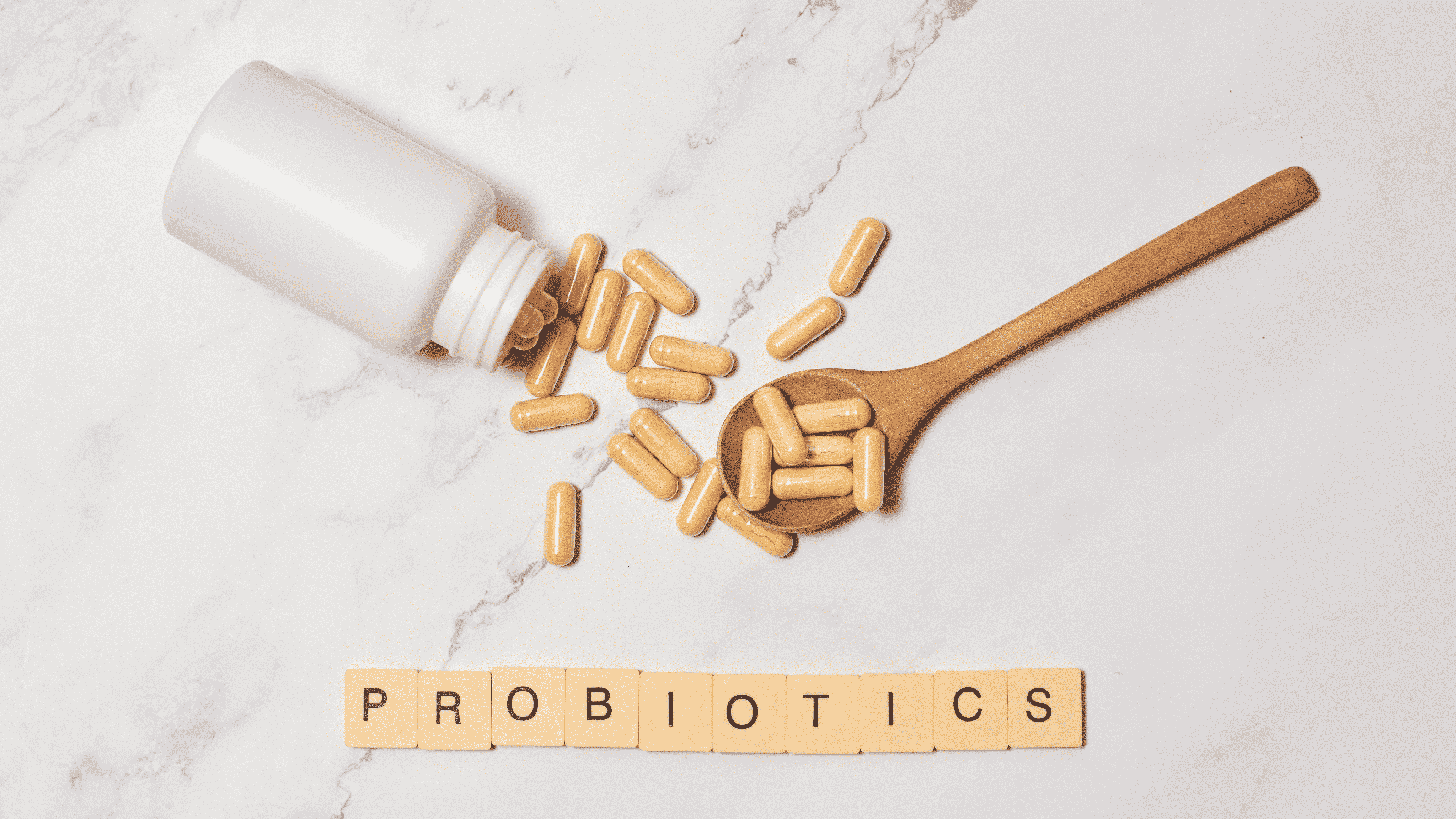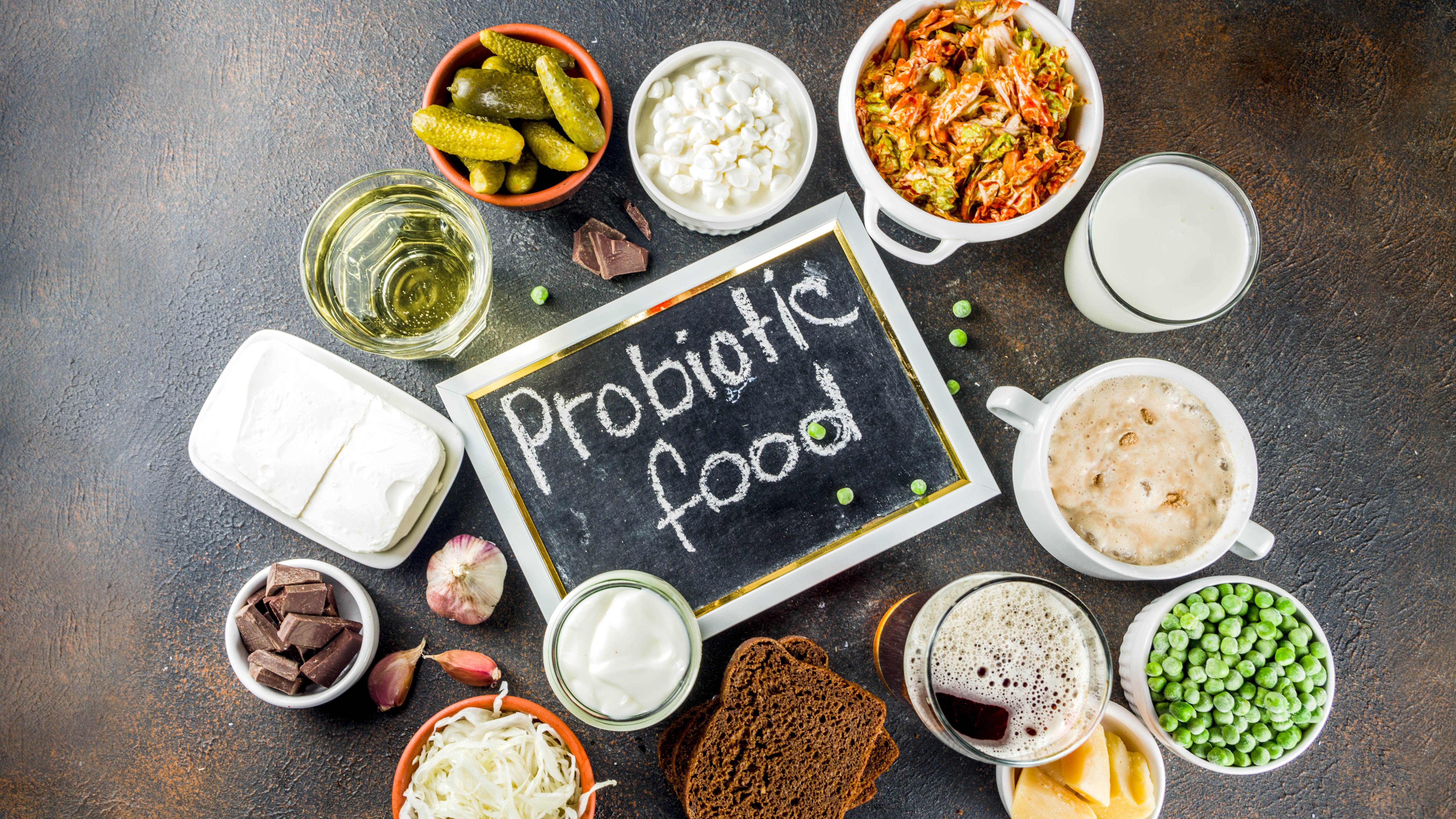How Probiotics Shape Gut Microbiome, Immunity, and Brain Function
Introduction
The gastrointestinal tract is not solely responsible for digestion and nutrient absorption; the trillions of microbes within it are equally important. The collection of all microbes, including bacteria, fungi, viruses, and protozoans, make up the human gut microbiome. This complex ecosystem is influenced by diet and lifestyle.
In recent years, research has shown that the gut microbiome’s role goes far. Therefore, a lot of attention has been given to probiotics for gut health, due to their ability to support the gut microbiome, and thus promote overall balance and wellness. When this delicate balance is disrupted, beneficial bacteria decrease while harmful bacteria increase, leading to gastrointestinal issues and other systemic diseases. Therefore probiotics are supplemented to maintain a balanced gut microbiome that plays a key role for gut health, immunity, and overall wellbeing.

What are Probiotics?
Probiotics are live microorganisms (bacteria and yeasts) that, when consumed in the right amounts, confer significant health benefits to the host. They can be taken as dietary supplements such as capsules or obtained naturally through fermented foods and beverages like curd, sauerkraut, and kombucha. These beneficial microbes play a key role in maintaining healthy gut flora and supporting overall nutrition by aiding digestion and nutrient absorption in the intestine, and have potentially wide-ranging benefits for the rest of the body.
Some of the most well-known and widely studied probiotic strains that are commercially available include:
- Saccharomyces boulardii (yeast)
- Bacillus coagulans (bacterium)
- Species belonging to the genera Lactobacillus and Bifidobacterium (bacteria)
Regular consumption of probiotics supports gut health, strengthens the immune system, helps prevent infections, and promotes mental well-being, thereby offering comprehensive health benefits. They also contribute to the production of SCFAs (short-chain fatty acids) that improve metabolism, balance serotonin levels, and positively influence mood and anxiety, ultimately promoting long-term wellness.
How Do Probiotics Reshape the Gut Microbiome?
Has your mother or grandmother ever suggested having a bowl of curd when you complained about an upset stomach? Or noticed your doctor prescribing probiotics for gut health along with, or right after, antibiotics when you had food poisoning? Ever wondered why?
That’s because probiotics whether in curd, yogurt, or supplement form have the remarkable ability to reshape the gut microbiome, restoring it to a more balanced and beneficial state.You can also read more about the signs your gut microbiome is out of balance to understand when your gut might need extra probiotic support.
Here’s how probiotics restore gut health:
Colonization and competition: When consumed, probiotics grow and establish themselves in the gut by utilizing available space and nutrients. Their dominance leaves little room and resources for harmful microbes to survive, gradually increasing beneficial microbes and resetting gut balance.
Production of antimicrobial compounds: Probiotics produce natural substances like bacteriocins and hydrogen peroxide that directly target and eliminate harmful bacteria.
Creating a healthy gut environment: Probiotics produce organic acids, including short-chain fatty acids (SCFAs), that lower gut pH, creating a hostile environment for pathogens while supporting beneficial microbes. These SCFAs also strengthen the gut barrier, overall gut health.
Because of these proven benefits, probiotics are often recommended for managing digestive issues like diarrhea, constipation, irritable bowel syndrome (IBS), inflammatory bowel disease (IBD), and lactose intolerance.
How do probiotics regulate the immune system?
Our body has an inbuilt defense system, the immune system that protects us from harmful toxins and microbes. The gut microbiota plays a vital role in digestion, nutrient absorption, and vitamin synthesis. In return, our body provides these beneficial microbes with shelter and nourishment within the intestine.
The human gut microbiome microbiome also has an influence on immune cells and overall immune health. Continuous communication between the gut microbiome and immune cells keeps immune responses balanced. However, when this interaction is disrupted due to gut dysbiosis, the immune system becomes overreactive, leading to inflammation, autoimmune and chronic diseases. Probiotics help restore a healthy gut microbial balance and regulate immune responses for overall health.
Key mechanisms through which probiotics shape the immune response include:
Activation of innate immune cells: Certain probiotic strains like Lactobacillus activate innate immune cells such as macrophages, dendritic cells, and natural killer cells. These cells detect pathogens, produce antimicrobial compounds, and eliminate harmful microbes.
Regulation of adaptive immunity: Probiotics promote the development of regulatory T cells (Tregs) that prevent overactivation of the immune system, enhancing tolerance to common allergens and reducing the risk of autoimmune diseases and allergies such as rhinitis and eczema. They also boost the production of secretory IgA antibodies, which strengthen gut barrier integrity and keep pathogens at bay.
Anti-inflammatory effects: Probiotics suppress pro-inflammatory cytokines, the chemicals responsible for inflammation, thereby reducing the risk of inflammatory disorders, obesity, and metabolic diseases. Their anti-inflammatory properties have also shown promise as supportive therapy in neurological conditions like autism and Parkinson’s disease.
How do probiotics mediate gut-brain communication?
Ever felt butterflies in your stomach before a big presentation? Or noticed your gut acting up when you’re stressed? That’s your gut and brain communicating!
Even though they are physically far apart, the gut and brain are connected through neural pathways, hormones, immune cells, and cytokines forming the gut–brain axis. This communication allows the gut microbiome to influence mood, cognition, and emotional health.
The gut microbiome produces and regulates key neurotransmitters such as Gamma-aminobutyric acid (GABA), serotonin, and dopamine, which affect brain function, mood, emotions, and cognitive performance. Besides neurotransmitters, microbial metabolites like short-chain fatty acids (SCFAs) including acetate, propionate, and butyrate, produced during fiber fermentation support brain function and reduce inflammation, further strengthening gut brain communication.
Given the gut microbiome’s impact on brain function, probiotics for gut health are increasingly being used to support mental wellness and overall balance. Natural probiotics for gut health, found in fermented foods like curd and yogurt, help restore microbial balance.
- Lactobacillus plantarum P-8 supplementation has been shown to reduce anxiety and stress symptoms.
- A multi-strain probiotic capsule containing 14 bacterial strains including B.subtilis, B.bifidum, B. breve, B. infantis, B. longum, L.acidophilus, L. delbrueckii ssp. bulgaricus, L. casei, L. plantarum, L. rhamnosus, L. helveticus, L. salivarius, Lactococcus lactis, and Streptococcus thermophilus improved symptoms of Major Depressive Disorder.
Mental stress can disrupt gut balance, and gut dysbiosis can worsen mental health. While the exact mechanisms of probiotics in brain function are still being studied, they help create a healthy gut environment, promote beneficial microbes, enhance nutrition absorption, and support overall well-being.
Maximizing the Benefits of Probiotics
Check the Label and Dosage: Before choosing a gut health supplement, always check the label for the colony-forming units (CFUs) and strain information. In general, an effective probiotic dosage ranges between 10⁷ to 10⁹ CFU/mg per day. Also, ensure the product is consumed before its expiry date for maximum effectiveness, as live microbes lose their potency over time. These active strains play a vital role in maintaining a healthy intestinal flora and supporting overall wellness.
Best Time to Take Probiotics: There is often confusion about the right time to take probiotics. A recent study found that consuming probiotic supplements 30 minutes before a meal or with food containing healthy fats results in higher survival rates of probiotic bacteria compared to taking them 30 minutes after a meal. Timing your probiotic intake properly can significantly improve their benefits.
Increase Your Probiotic Intake Naturally: In addition to supplements, include natural sources of probiotics in your daily diet. Foods like curd, pickled vegetables, kombucha, and kefir are rich in beneficial microbes and often contain some amount of prebiotics, which help these microbes thrive in your gut. Relying on natural probiotics can also reduce initial digestive discomforts such as bloating that may occur with supplements. To learn more about how probiotics support different age groups, check out this guide on Geriatric Probiotics – A Simple Guide for Seniors.

Conclusion
Your gut microbiome doesn’t work alone -it’s a complex ecosystem that impacts your entire body. Research shows that a healthy gut microbiome, supported by probiotics, influences more than just digestion - it plays a vital role in boosting immune health, supporting mental wellness, and enhancing overall well-being. While there’s no one-size-fits-all solution, incorporating probiotic-rich foods and evidence-based probiotic supplements can help you harness these powerful gut-body connections. A gut microbiome test can help you design a personalized probiotic blend tailored to your individual needs.
-Sushma K
References
Latif, A., Shehzad, A., Niazi, S., Zahid, A., Ashraf, W., Iqbal, M. W., ... & Korma, S. A. (2023). Probiotics: mechanism of action, health benefits and their application in food industries. Frontiers in microbiology, 14, 1216674.
Tompkins, T. A., Mainville, I., & Arcand, Y. (2011). The impact of meals on a probiotic during transit through a model of the human upper gastrointestinal tract. Beneficial microbes, 2(4), 295–303. https://doi.org/10.3920/BM2011.0022
Cristofori, F., Dargenio, V. N., Dargenio, C., Miniello, V. L., Barone, M., & Francavilla, R. (2021). Anti-inflammatory and immunomodulatory effects of probiotics in gut inflammation: a door to the body. Frontiers in immunology, 12, 578386.
Akram, N., Faisal, Z., Irfan, R., Shah, Y. A., Batool, S. A., Zahid, T., ... & Khan, M. R. (2024). Exploring the serotonin‐probiotics‐gut health axis: A review of current evidence and potential mechanisms. Food Science & Nutrition, 12(2), 694-706.